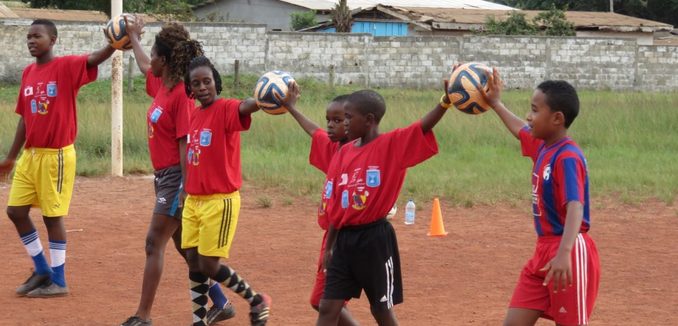Children with special needs are often sidelined in life, and especially in sports. The Israeli nonprofit Mifalot: Sport for Education, Development and Peace trains football (soccer) coaches in Israel—and in developing countries, too—how this very popular sport can be a tool to enhance social inclusion and other values.
Mifalot’s “Game of Life” program uses sports to promote self-confidence, trust and mutual engagement, and football in particular as a therapeutic mode of education for youth with physical and mental disabilities.
“We put an emphasis on tolerance, on getting to know the ‘other.’ A kid with physical disabilities can be seen as weird or scary but once you play together you see it doesn’t matter,” says Keren Lavi, international development manager of Mifalot.
Since 2007, Mifalot has trained coaches in 15 countries, such as Colombia, Myanmar, India, Nepal, Cameroon, Liberia, Ghana and the Philippines. In 2016 it partnered with MASHAV, the Israeli Foreign Ministry’s Agency for Development Cooperation.
“This is a program that’s trying to change mindsets about people with special needs, teaching that they can be useful in society. That’s a new idea in many countries,” says Adam Levene from MASHAV’s department of policy and international relations. “We’ve done three training sessions with Mifalot and are looking to do 10 more in the near future.”
Each overseas training camp is tailored in partnership with a local organization. Usually, 40 or 50 coaches participate in the weeklong camp, which includes opportunities to practice what they’ve learned with local children.
Lavi tells ISRAEL21c about Kollie, a participant in a recent training in Liberia.
“Kollie is a teacher and he loves sports, but he never saw sports as an educational tool. It was interesting to see throughout the week how he slowly got the idea,” Lavi says. “He recently told me that they’re starting the program in schools using our equipment and a social-inclusion game he made up.”
“That’s what we strive for – to have them implement the methodology within their own culture. At the end of the day, football is football and just needs the right adaptation to the local culture.”
Mifalot workshops do not always focus on special-needs children. Sometimes the emphasis is how to use sports to educate about peace-building or empowering women, protecting children or preventing drug or alcohol abuse among at-risk youth.
“For example, we heard that 70 percent of women in Liberia have been sexually abused,” says Lavi. “We want them to think about what they want for their future. If the coaches raise these issues with the kids they coach, they can create a safe environment to talk about these issues outside of school. The coach becomes not only a sports facilitator but also an educator. It’s beautiful to see it happen.”
Mifalot returns to each country a few times to follow-up on the initial training.
(via Israel21c)
[Photo: Israel21c]




